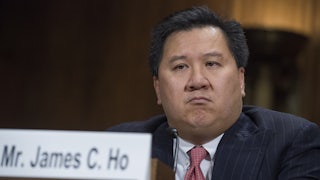On October 3, Justice Ketanji Brown Jackson, the first Black woman to be confirmed to the Supreme Court, took her seat on the nation’s highest court. It is charged with interpreting our Constitution and guarding our rights against the powerful who might choose monopoly or monarchy or both. She, this daughter of immigrants with an ancestry subjugated to slavery, does so at a time when most of the nation is fearful for the future of our democracy. From money in politics and the power it wields, to our divisions, to threats of violence in our elections, there are plenty of reasons for folks to be afraid. Can Jackson help pull our democracy, teetering precariously at the edge of a cliff of hate, fear, and division, back from the brink?
It is not all up to the Supreme Court of course—which is a good thing. The honest truth is that the Supreme Court is now as polarized as our nation. And just like the country, a group of ideologues, whose viewpoints are at odds with that of the majority of this nation’s, hold more sway than they should, causing some of the lowest confidence ratings in the court ever. The courts do not write laws or amend the Constitution, but interpreting both is powerful. There has been some important, albeit narrow, progress on legislation to protect the peaceful transition of power after a presidential election. The House passed reforms to the Electoral Count Act, to clarify what no president, who lost reelection, ever doubted before—that a sitting vice president cannot throw out electoral votes to steal the boss’s seat back. It appears to have the votes to pass the Senate, but the reforms, while important, do not respond to one of the central threats to our democracy: representation, particularly for voters of color.
With this backdrop, Jackson met the moment. She demonstrated the importance of representation on the high court in determining representation in elected office. The first Black woman justice delivered a master class on democracy and the Constitution at her first oral argument, which took up a historic case on racial discrimination and whether race can be a factor in protecting Black voters’ ability to elect members of Congress. In doing so she proved that history not only matters, but that knowing history is essential in understanding how we look at race in order to protect people of color from discrimination. Public education and democratic discourse happen in many ways. Supreme Court justices help frame the questions and drive public attention to the facts that help all of us consider how they should be answered.
Alabama’s population is 27 percent Black. In fact, the largest increase in the state’s population between the 2010 and 2020 census was the number of Black residents—almost 90,000 more souls. There should certainly be two Black congressional districts in Alabama. Yet the state legislature packed Black residents into a single district.
A three-judge federal court, which included two Trump appointees, said the move violated the remaining section of the Voting Rights Act, still enforceable after the Supreme Court took an axe to one leg of the transformative legislation in Shelby County v. Holder, another Alabama case, in 2013. They said, in fact, that its violation wasn’t even a close call. It was clear. The section still in effect, which the Supreme Court has said protects Black people and other people of color from having their voting power diluted through redistricting, is now up for grabs.
The state of Alabama argued that it should be allowed to to ignore race in redistricting, which is to say, be color-blind. It’s like saying, as long as no one can show we tried to dilute Black voting power, then we should be able to dilute Black voting power. Jackson pointed to the absurdity of the argument. She said that the Framers themselves adopted the equal protection clause, the Fourteenth Amendment, the Fifteenth Amendment, in a race-conscious way. That they were, in fact, trying to ensure that people who had been discriminated against, the freedmen during the Reconstruction period, were actually made equal with everyone else in society. “That’s not a race-neutral or race-blind idea,” Jackson said.
Using the Framers against the conservative justices who like to rely upon them to undermine constitutional rights, Jackson laid a foundation for what Justices Sonia Sotomayor and Elena Kagan stressed about present-day realities of discrimination and “cracking” (breaking up) of Black communities over and over again, while white districts remain intact. Using a “race-blind” tool to do that is not legally relevant.
Alabama wants to show that it didn’t take race into account when it failed to create a second congressional district with enough Black residents to create the possibility that Black Alabamans might be able to send two members of Congress to the House of Representatives instead of one. But as Jackson pointed out, housing segregation is one reason why there are Black people clustered in a way that creates a compact district in the first place. Present-day realities of past discrimination matter in the historical context she helped set. She went on to say, “It’s not neutral, the situation that we are approaching in this situation. We’re talking about a situation in which race has already infused the voting system.”
The attack on the right to vote is a central danger to the health and future of our democracy, which is supposed to be representative. If we are honest with ourselves as a nation, we will acknowledge the depth and root of this threat. The root is an existential fear of the changing complexion of the country and its perceived threat to white cultural identity. Without evidence, GOP political operatives are claiming, not for the first time, that our elections are endangered by fraudulent voting. From North Carolina to Florida, some political operatives have admitted to passing voter identification laws to make it harder for Black citizens to vote because of the party they typically vote into office. This is not ancient history. These are today’s facts.
In this year’s midterm elections alone, the Supreme Court has allowed racial and partisan gerrymandering to stand in four states: Alabama, Louisiana, Ohio, and Georgia, despite lower federal courts finding it unlawful. These four states on their own may determine the outcome of five to seven House races in a hotly contested midterm election year, along with two hotly contested Senate seats. Hanging in the balance is the future of abortion rights and much more.
Diluting the voice of Black voters will be a factor in the outcome of the elections. But Jackson has elevated and illuminated the debate we must have and the facts we must share if we are to come together and be a representative democracy in which we all have a say in who leads us.






